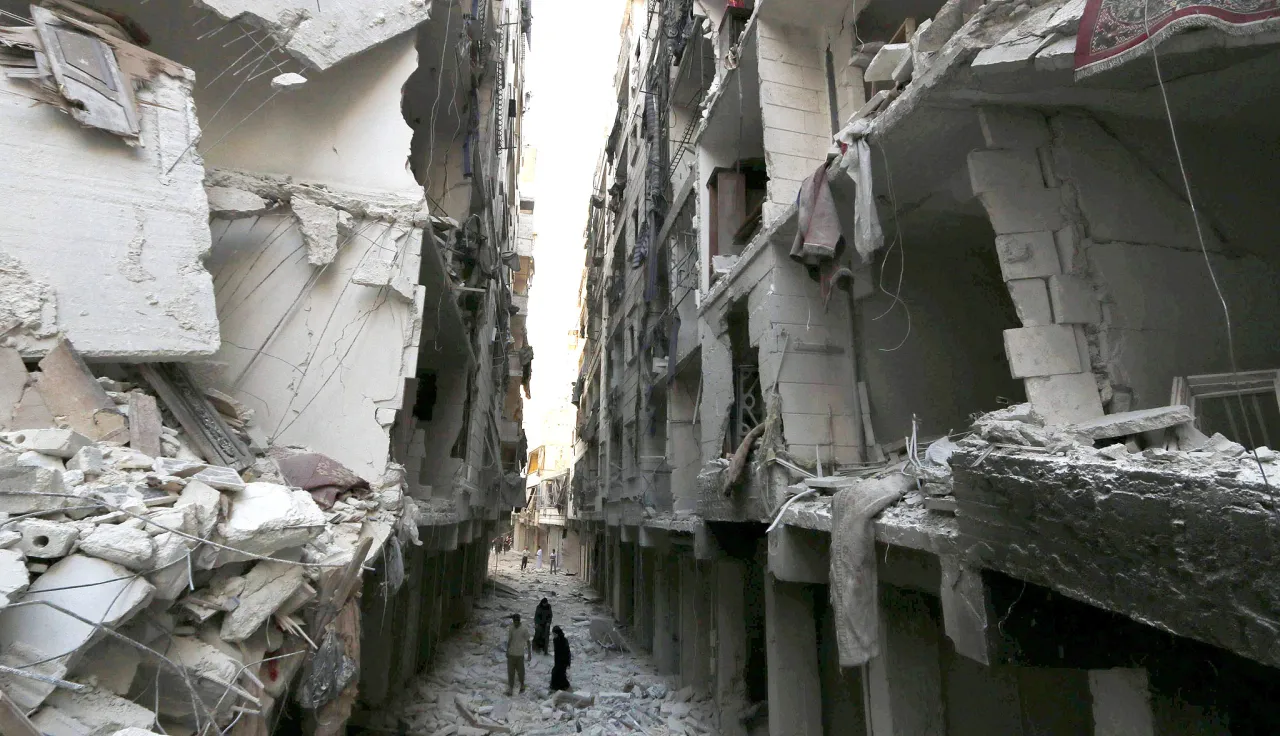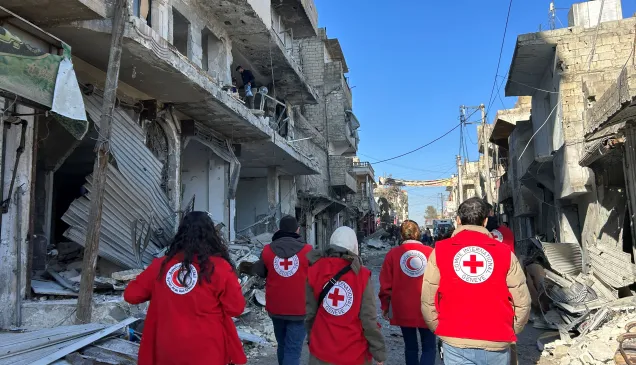Syria: ICRC steps up aid efforts across Aleppo

Country-wide intensification of hostilities has claimed the lives of thousands and worsened access to water, food, and basic health-care services for tens of thousands of people. Over three million people in Aleppo governorate continue to suffer from the fighting, which has caused severe damage to the water network. Tens of thousands are still being displaced and have only limited access to health care, especially in opposition-held areas.
"Civilians are living in appalling conditions," said Ghandi Mossaad, who is in charge of the ICRC's Aleppo office. "Indiscriminate attacks on both sides continue to increase civilian death tolls, tear families apart and deteriorate the general humanitarian situation in the governorate."
As a result of negotiations with all parties, the ICRC received the authorizations it needed to deliver food, hygiene items, towels, blankets, mattresses, rechargeable lights, buckets and candles to over 30,000 people living in Jisr Al Hajj, across the opposition-held areas on the eastern side of Aleppo. This is another significant step in the efforts to bring in much-needed supplies.
Cooperating closely with the Syrian Arab Red Crescent, the ICRC has provided food and other relief for over 445,000 people across Syria.
Enough medical supplies have been delivered throughout July by the ICRC to hospitals in the governorate to enable them to treat up to 500 patients with serious weapon-caused or other injuries. Syrian Arab Red Crescent volunteers crossed into opposition-held areas and distributed medical supplies to hospitals in Al Bab and Manbij. The Syrian Arab Red Crescent also delivered medical items to a hospital in the government-controlled western side of Aleppo city. In addition, the ICRC provided an electric generator for the Syrian Arab Red Crescent paediatrics hospital in the Al Aziziyya area of the city, which provides care for over 6,000 people every month.
"Stepping up aid distributions in the governorate has been the ICRC's priority ever since we established a permanent presence in the city over a year ago," said Daphnée Maret, the deputy head of the ICRC delegation in Syria, who oversees the organization's relief activities. "We are hopeful that as we gain greater access and become more accepted, we will be able to do more in Aleppo, and similarly in other areas badly in need of aid in Syria, such as Homs, Hama, Deir Ezzor, Hassakeh, and Raqqa."
In close cooperation with local water boards, the ICRC and the Syrian Arab Red Crescent have also been striving to improve access to clean water for millions of people throughout the governorate by performing emergency repairs on the water network and equipping boreholes with generators, pumps, pipes, and taps. The record-low rainfall has further limited the population's access to water.
A total of 19 people, including doctors and engineers, are currently employed by the ICRC in its Aleppo office. The organization is considering the possibility of starting a much-needed physical rehabilitation programme in the city.
Facts and figures – July 2014
The ICRC is currently working in Damascus, Aleppo and Tartus. Over 270 staff are distributing food, restoring the water supply, improving health care and re-establishing contact between people separated by the conflict.
Emergency aid
In July, the ICRC supplied food to over 362,000 people in nine governorates: Damascus, Rural Damascus, Quneitra, Sweida, Homs, Hama, Tartus, Lattakia and Aleppo. The vast majority of the people receiving the aid were displaced within their own country. Nearly 8,000 people living in shelters in Aleppo, Lattakia and Rural Damascus received daily meals in collective kitchens supported by the Syrian Arab Red Crescent and supplied by the ICRC. Nearly 75,000 others displaced by the fighting were given household essentials such as hygiene items, blankets, mattresses, towels, water buckets, rechargeable flashlights, candles, and cooking sets.
Water and sanitation
The ICRC worked closely with the Syrian Arab Red Crescent and local water boards to provide:
- dozens of tanker trucks that brought water to more than 185,000 people in Homs, Rural Damascus, Hama and Deir Ezzor;
- financial support enabling a rubbish collection truck to operate in Idlib city, thereby providing more sanitary living conditions for 100,000 people;
- upgrades to 12 centres housing displaced people, bringing clean water, proper sanitation and decent housing to 27,000 people in Damascus, Rural Damascus, Dara'a, Qunitera and Idlib;
- pesticides for use in a public-health spraying campaign against leishmania skin disease in Aleppo and Lattakia, which have a combined population of around 4,200,000;
- repairs to the main electric generator at Barzeh's water pumping station, in particular so that 165,000 people who recently returned to the area would have clean water;
- repairs to water mains in Douma city providing around 25,000 people with potable water;
- ten submersible pumps for boreholes in Rural Damascus (Al Kisweh and surrounding areas) so that 30,000 people would have water;
- repairs to water mains and submersible pumps in many places in Rural Damascus, such as Najha, Saideh Zeinab, Daf AlShok and Hafier Al Tahta, providing over 650,000 people with water;
- 17 water tanks in Suweida to improve people's access to water;
- repairs to two trucks in Dara'a that distribute water from emergency water points to tanks supplying the city of over 250,000 people;
- electric generators, pumps, and other equipment for alternative water sources in Aleppo.
Health
The ICRC also worked closely with the Syrian Arab Red Crescent to provide:
- financial support and supplies for nine Syrian Arab Red Crescent mobile health clinics and an outpatient care facility in Hama, which together have the capacity to provide health services for over 7,000 people every month;
- enough medical supplies for hospitals to enable them to treat up to 500 patients with serious weapon-caused or other injuries in Aleppo city, Al Bab and Manbij;
- an electric generator to power the Syrian Arab Red Crescent paediatrics hospital in Al Aziziyya, Aleppo, which provides services for over 6,000 people every month.
Other services
The ICRC:
- arranged for a phone call to be made between a detainee in Malaysia and his family in Syria;
- received 21 tracing requests at its delegation in Damascus from people seeking to locate their relatives;
- facilitated the crossing into the occupied Golan of 47 students returning to their home villages for the summer holidays;
- distributed nine Red Cross messages (containing brief family news) and 34 salamats (oral messages to family members), mainly from Syrians abroad.
For further information, please contact:
Ralph El Hage, ICRC Damascus, tel.: +963 930 336 718
Sitara Jabeen, ICRC Geneva, tel: +41 22 730 24 78 or +41 79 536 92 31



